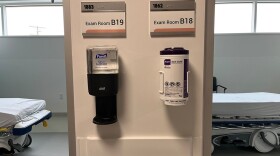A statement issued this week by the leader of Phillips Exeter Academy in defense of two deans contradicts a New Hampshire State Police report from 2016. The report alleges two deans had violated a mandatory sex abuse reporting law.
Rockingham County Attorney’s office decided against criminal charges, with deans Melissa Mischke and Arthur Cosgrove now remaining on campus.
Morning Edition Host Rick Ganley spoke with attorney Peter Hutchins about the dropped charges, and sexual harassment reporting at high schools.
(Editor's note: this transcript has been lightly edited for clarity.)
This was an assault that occurred between two students on campus. Let's go over the state's mandatory reporting law under the Child Protection Act. What does the law require of school officials when they hear claims of sexual harassment between students?
Well the statute, which is RSA 169-C, requires a long list of people, including school officials. When they have reason to suspect that sexual assault or sexual misconduct has taken place involving a minor, then they must report it to law enforcement officials. The rub comes now when you're trying to charge someone criminally for violating this statute that in order to violate the criminal law, which is endangering the welfare of a child, it must be proven that the individual knowingly endangered the child by purposely violating this duty. So, they may have had a duty in hindsight and had reason to suspect abuse, and they should have reported. But the criminal issue becomes did they knowingly endanger the child by purposely violating that law?
Right, and there's a bar that needs to be met there. So this detailed report from the state police determined that there was probable cause to believe that the deans did commit a crime. The report says they were notified of the suspected abuse. They did not immediately report it. Then in a statement released earlier this week, the deans said they did not believe that it was a quote “reportable offense” in their opinion. What then is considered a reportable offense?
Well, essentially it's any sexual assault or sexual misconduct involving a minor, which is defined by the statute as anyone under the age of 18. So in this case, you had two students - a male was 18 and the female was 17. She was the one that reported being essentially fondled by this male student. So that would count under the statute. It should have been reported. Probably from the perspective of the school administrator, they say well this is something you know between students and we'll take care of it themselves. And I think that's something we see with these private boarding schools, where they want to essentially deal with student problems themselves internally, and not get the police involved for a whole variety of different reasons. But in this particular case, the way the law is written, it should have been reported.
And the Rockingham County prosecutor, Patricia Conway, opted not to bring those charges against the two deans. She said earlier in the week that she didn't believe that she could prove the case in court beyond reasonable doubt. So what makes a case like this so difficult to prove?
Well essentially what you just said, that burden of proof beyond a reasonable doubt. That is a very, very high burden of proof. It's not mathematical in the law, but look at it as 95 to 5 percent. Where in the civil world, which is where I dwell and I would bring a civil case on behalf of the victim in a case like this against the school itself, I only have to prove my case by a preponderance of the evidence, by 51 percent, a much lower standard, much easier to prove. But in the criminal law, a prosecutor every day whenever they get a new case put on their desk, they have to say is my evidence strong enough that I have in front of me that I believe I could convince a jury beyond reasonable doubt. And in this case she must have thought she could not have convinced 12 jurors that these two deans knowingly endangered the welfare of a child by purposely violating the Child Protection Act. That is the standard for charging them with a misdemeanor.
I want to ask you, there's a report in The Union Leader this morning that these two deans had at some time met with the students, and the students had met with each other. How does that figure into a case like this?
Well that's the initial report. From what I understand, it was back in October of 2015 that the female student, along with her advisor, met with these two deans, Mischke and Cosgrove, I believe. And that's when it was first reported, and then apparently there was a meeting with the deans with county attorney Conway in January 2017. And that particular report says that when Philips Exeter said and issued the statement that they cooperated fully with the police, the trooper is disputing that saying: no, I couldn't get statements from these people, couldn't get statements from the school counselor and a variety of other people. So there was no cooperation. So that's what raises the specter of essentially a cover-up in a situation like this.








